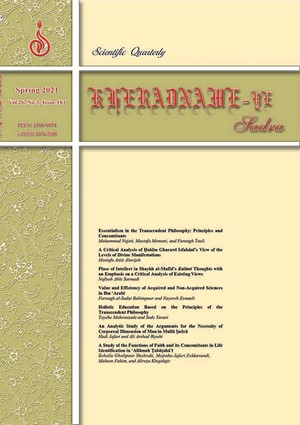A Study of the Functions of Faith and its Concomitants in Life Identification in ‘Allāmah Ṭabāṭabā’ī
Subject Areas :Soheila Golipoor Shrakey 1 , Mojtaba Jafari Eskavandi 2 , Mohsen Fahim 3 , Alireza Khajegir 4
1 - PhD candidate of Islamic Philosophy and Kalam, Department of Theology and Islamic Studies, Islamic Azad University, Najafabad Branch, Najafabad, Iran
2 - Assistant Professor, Department of Theology and Islamic Studies, Islamic Azad University, Najafabad Branch, Najafabad, Iran
3 - Assistant Professor, Department of Theology and Islamic Studies, Islamic Azad University, Najafabad Branch, Najafabad, Iran
4 - Assistant Professor, Department of Comparative Religions and Mysticism, Faculty of Literature and Humanities, Shahrekord University, Shahrekord, Iran
Keywords: Faith act happiness morality religious life meaning of life ‘Allāmah Ṭabāṭabā’ī ,
Abstract :
Faith is the most essential element of spiritual life, the jewel ornamenting the human soul, and the most brilliant ray of the higher world. One of the most important kalāmī problems is the discussion of faith and the related elements so that one cannot ignore its fundamental role in the formation of life identification. The present study examines the function of faith and its concomitants in life identification in the view of ‘Allāmah Ṭabāṭabā’ī based on a descriptive-comparative method. The library method was used to collect the required data for the study from the works of ‘Allāmah Ṭabāṭabā’ī and other related books and sources. The collected data was later analyzed and evaluated based on his epistemological and anthropological principles. The findings of the study indicate that he considers faith to be a heart-related affair and maintains that it is necessary to commit oneself to its concomitants and practical effects. He also believes that, based on Islamic principles, faith is of four levels, the most important of which is the fourth one. Here, the authors also investigate the function of devotion in acting in the light of faith, the inseparability of faith and act, the effect of act on Man’s happiness, and the relationship between faith and morality in Man’s identification. ‘Allāmah Ṭabāṭabā’ī has referred to peace of heart, disappearance of doubt, humbleness, and kindness among the effects and benefits of faith. From an epistemological point of view, having faith in religious life, in addition to creating a positive and hopeful attitude, grants meaning to human life.
قرآن كريم.
ايزوتسو، توشيهيكو (1378) مفهوم ايمان در كلام اسلامي، ترجمه زهرا پور سينا، تهران: سروش.
سبحاني، جعفر (1391) ايمان و آثار سازندة آن، قم: مؤسسه» امام صادق (ع).
شمس، مرادعلي (1384) با علامه در الميزان از منظر پرسش و پاسخ، ج1، قم: اسوه.
طباطبايي، سيدمحمدحسين (1363) الميزان، ترجمه محمدباقر موسوي همداني، ج1و 9و 11و 15و 18، قم: مؤسسه مطبوعات دارالعلم.
طباطبايي، سيدمحمدحسين (1371) الميزان في تفسيرالقرآن، ج3 و 9، قم: اسماعيليان.
طباطبايي، سيدمحمدحسين (1374) ترجمة تفسيرالميزان، ج7 و 8 و10 و12 و18، قم: دفتر انتشارات اسلامي.
طباطبايي، سيدمحمدحسين (1388) بررسيهاي اسلامي، ج1و2، قم: بوستان كتاب.
طباطبايي، سيدمحمدحسين (1391) تحريري بر اصول فلسفه و روش رئاليسم، ج5، بكوشش محمدباقر شريعتي سبزواري، قم: بوستان كتاب.
طباطبايي، سيدمحمدحسين (1391) تعاليم اسلام، بكوشش سيدهادي خسرو شاهي، قم: بوستان كتاب.
فرانكل، ويكتور (1354) انسان درجستجوي معني، ترجمه اكبرمعارفي، تهران: دانشگاه تهران.
فلين، توماس (1391) اگزيستانسياليسم، ترجمه حسين كياني، تهران: بصيرت.
فيروزي، رضا (1395) نظريه ايمان، تهران: پژوهشكده مطالعات فرهنگي و اجتماعي.
مطهري، مرتضي (1375) آشنايي با قرآن، ج4، قم: صدرا.
مطهري، مرتضي (1376) علل گرايش به ماديگري، تهران: صدرا.
مطهري، مرتضي (1382) مقدمهاي بر جهان بيني اسلامي، قم: صدرا.
ملكيان، مصطفي (1389) مهر ماندگار، تهران: نگاه معاصر.
هيك، جان (1381) فلسفه دين، ترجمة بهزاد سالكي، تهران: الهدي.
واعظي، احمد (1377) انسان از ديدگاه اسلام، ج1، تهران: سمت.
يونگ، كارل گوستاو (1377) انسان و سمبلهايش، ترجمه محمود سلطانيه، تهران: انتشارات جامي.


